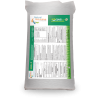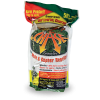Learn how to get rid of grubs in your lawn naturally with Natural Alternative's easy & effective methods. We'll guide you to a grub-free, green, and healthy lawn.
Table of Contents:
- Where Do Grubs Come From?
- The Trouble with Grubs
- Spotting the Signs of Grubs
- Additional Damage by Unwanted Visitors
- When to Act Against Grubs
- How to Control Grubs the Organic Way
- Natural Grub Control FAQs
- Let's Connect: Reach Out to Us for Your Grub Control
- Key Takeaways
Are you battling an army of grubs lurking beneath your lawn? You're not alone. These troublesome little creatures can wreak havoc on your beautiful yard, disrupting your lawn's health and aesthetic appeal. But don't worry. There's no need to resort to harsh chemicals or complicated treatments. Natural Alternative has a holistic, easy-to-follow, natural approach to controlling grubs.
We'll guide you through everything you need to know about grubs, including their origins and the damage they cause to the signs that reveal their presence.
Most importantly, we'll walk you through how to naturally get rid of grubs in your lawn to help you manage and reduce these pesky critters effectively.
Let's delve into the world of grubs and find out how you can maintain a healthy, green lawn that's naturally grub-free.
Where Do Grubs Come From?
Grubs might be tiny pests, but they stem from a more significant source, beetles. Yes, those grubs nibbling away at your lawn roots are the offspring of various beetles, including the notorious Japanese beetle, June beetle, and the European chafer.
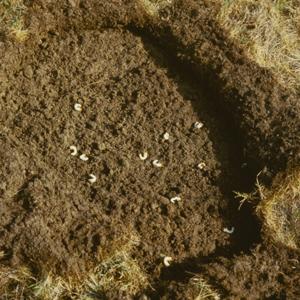
Adult beetles fly around during the warmer months, looking for a perfect spot to lay their eggs, preferably in the soil of a flourishing lawn.
Once these eggs hatch, a white grub ready to start its life cycle emerges.
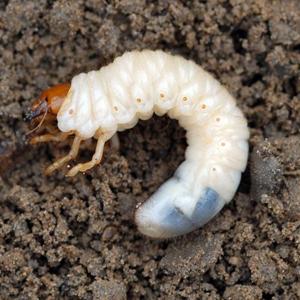
These grubs are tiny, nearly invisible to the naked eye. But don't let their size fool you. They are on a mission to grow, and their preferred food source is the roots of your lawn grass. As they feed and grow, they become more visible, reaching an inch long.
The life of a grub is a cycle, starting from a beetle's egg laid in your lawn, developing into a root-munching larva, and eventually morphing back into an adult beetle to continue the cycle.
Understanding this cycle is crucial because this knowledge can arm us with the strategies to disrupt their life cycle and protect our lawns naturally.
The Trouble with Grubs
As grubs grow and their appetites increase, they can bring quite a lot of trouble to your outdoor green spaces. The heart of the problem lies in their feeding habits. Grubs are not surface feeders, as they reside in the soil while feeding on the roots of your lawn and garden plants.
Once they hatch in the fall, grubs feast on the roots beneath your lawn. They are relentless eaters and will continue to munch away until the onset of winter, when they retreat deeper into the ground, below the frost level, to await the cold months patiently.
Come spring, they return to the root zone, hungrier than ever. They resume their feast on the plant and lawn roots until it's time for them to undergo their transformation into adult beetles or chafers.
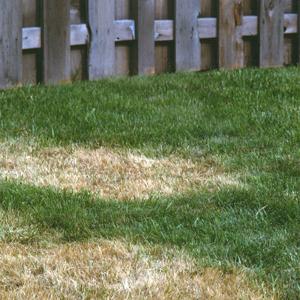
Once an adult, they emerge from the soil and continue their life cycle, feeding on the leaves of your plants, finding mates, and laying eggs to start the process all over again.
With grubs eating away at the roots, your lawn loses its vital support system. Over time, this root damage can lead to dying or dead grass patches.
If the infestation is severe enough, it might look like your lawn is suffering from drought, even if it's getting plenty of water. This double-edged sword of root and leaf damage makes grubs a menacing problem for lawns.
Spotting the Signs of Grubs
Grub damage is not always immediately visible, but there are sure signs that can tip you off.
You may first notice irregular, discolored patches of brown grass on your otherwise green lawn. These damaged patches are often the result of the grubs feasting on the roots of your grass and cutting off the plant's nutrient supply. The grass in these patches might feel spongy underfoot due to the weakened root structure.
An easy way to confirm if grubs are behind the brown patches is to do a small test.
Cut a one-foot square patch of grass at the edge of a brown, seemingly damaged area. Try to lift that piece of turf. The grass will peel back easily if grubs are at work, almost like a carpet, revealing the grubs underneath.
Remember, not all brown patches are due to grubs, and not all grub-infested areas will turn brown. Sometimes, your lawn might seem perfectly green but could still be harboring grubs beneath. Therefore, watching for increased bird activity on your lawn is another good practice. Birds love grubs; noticing them frequently pecking at your yard might signify a grub population beneath.
Identifying grub damage can be tricky, but don't stress! We at Natural Alternative are here to help. If you need clarification on the presence of grubs in your lawn, please contact us for expert advice on controlling grubs.
Additional Damage by Unwanted Visitors
Grubs themselves can be a headache, but their presence can attract additional, unwelcome guests to your lawn. Grubs are quite a delicacy for certain animals. Moles, skunks, and even some birds see your grub-infested lawn as an all-you-can-eat buffet.
These animals have a keen sense of detecting grubs beneath the soil. Once they know grubs are present, they won't hesitate to dig into your lawn for their next meal.
The digging results in unsightly holes and mounds scattered across your lawn, creating an additional layer of destruction on top of the damage already caused by the grubs.
If you've noticed more animals around your yard or found mysterious holes and mounds in your lawn, grubs might be the hidden cause. The good news is by controlling grubs, you can also discourage these grub-hunters from turning your lawn into their dining room.
When to Act Against Grubs
Knowing when to treat your lawn for grubs is essential for successful grub control. Grubs are most susceptible to control measures when they're actively feeding, which happens twice a year, during spring and early fall.
In spring, grubs emerge from their winter dormancy and start feeding on your grass roots, fattening themselves up for their transformation into adult beetles. In the early fall, newly hatched grubs from the latest batch of beetle eggs start their feeding cycle.
That's why spring and fall are the best times to take action against grubs. However, fall can be particularly effective for control measures of the two seasons since the grubs are younger, smaller, and just starting their feeding cycle. During this cycle, these pests are more vulnerable to natural grub control products, leading to a higher success rate.
For preventive measures, consider applying treatments in April or May, just as the mature grubs from the last season start their spring feeding. A follow-up application in the fall can help control the new generation of grubs before they have a chance to cause significant damage. This two-step approach can go a long way in keeping your lawn grub-free.
How to Control Grubs the Organic Way
Regarding grub control, your first instinct might be to reach for a strong chemical pesticide. Here at Natural Alternative, we believe in keeping things natural. After all, your lawn is a living ecosystem, and maintaining its health involves more than just getting rid of pests.
Your first step in natural grub control is to create unfavorable conditions for grubs. Grubs thrive in moist soil conditions. So, if you've been generously watering your lawn, it might be time to reassess your lawn watering routine. Instead of frequent light watering, switch to deep, infrequent watering to encourage the grass roots to grow deeper, making your lawn more resilient against grub damage.
Couple this with regular aeration and over-seeding, and you have a strong, healthy lawn that is less attractive to grubs and more resistant to their damage.
Despite our best efforts, sometimes a grub infestation can get out of hand, so it's essential to act swiftly to avoid lasting damage to your lawn. That's where Natural Alternative's range of natural grub control products comes into play.
Our Milky Spore Grub Control Powder is a naturally occurring bacterium safe for humans, pets, and beneficial insects. The Milky Spore bacterium works by infecting and killing grubs from the inside, and it starts working as soon as it's applied. The real beauty of Milky Spore Powder is that once a grub dies from the bacterium, it releases billions more spores into the soil, offering long-term control against future grub generations.
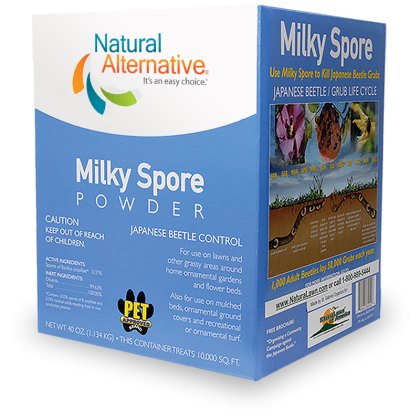
Next, we have grubGONE!, a natural organic grub treatment effective against all white grubs, not just Japanese Beetle grubs. GrubGONE! can be used as a preventative measure or to control active grub populations during the egg, larva, and pupa stages. Best of all, it does all this without harming beneficial insects and pollinators.
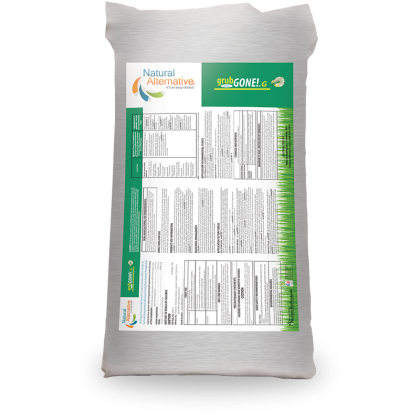
Lastly, we have beetleGONE! Beetle Control is your best bet against adult beetles during the mid-summer months. It effectively controls these unwelcome visitors from your landscapes, turf, and ornamental beds without causing harm to beneficial insects like bees, earthworms, and other pollinators.
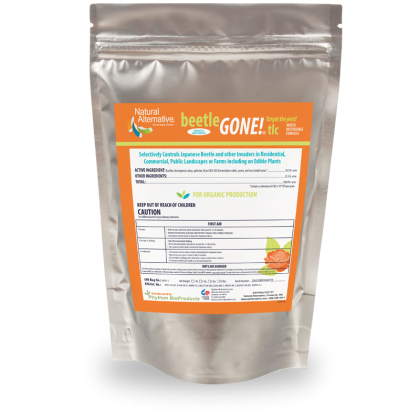
In the battle against grubs, understanding their life cycle is critical. Once you're familiar with their life stages and the signs of their presence, you can effectively time and apply our natural control products for maximum impact. We've created a helpful infographic to guide you on this.

Natural Grub Control FAQs
- What are grubs, and how do they damage my lawn?
- Grubs are the larval stage of beetles, including the Japanese beetle, June beetle, and European chafer. They feed on the roots of your grass, causing patches of dead grass on your lawn. Grubs are also a food source for animals like moles and skunks, which can cause further damage to your lawn when digging for grubs.
- When is the best time to treat my lawn for grubs?
- Grubs are most susceptible to treatment during their active feeding periods in the spring and fall. Fall treatments can be particularly effective as grubs are now younger and more vulnerable. For preventative measures, consider applying treatments in late spring (April or May) and then again in fall.
- How can I naturally reduce grub populations in my lawn?
- By changing your lawn care practices, you can create less favorable conditions for grubs. These practices include deeper, less frequent watering, lawn aeration, and over-seeding. These actions can discourage grubs and make your lawn more resilient to grub damage.
- What natural products does Natural Alternative offer for grub control?
- Natural Alternative offers Milky Spore, grubGONE!, and beetleGONE! for natural beetle & grub control. Milky Spore is a bacterium that infects and kills grubs, offering long-term control. GrubGONE! is an organic grub treatment effective against all white grubs and beetleGONE! controls adult beetles. All these products are safe for humans, pets, and beneficial insects.
- How does Milky Spore work?
- Milky Spore is a naturally occurring bacterium that starts working as soon as it's applied. When a grub ingests Milky Spore, it dies and releases billions more spores into the soil, offering control against future grub generations.
- What types of grubs does grubGONE! control?
- GrubGONE! is effective against all white grubs, not just Japanese Beetle grubs. This includes Scarab Beetles like Japanese, Asiatic, June and Oriental Beetles and European, Cupreous, Southern and Northern Masked Chafers.
- When should I use beetleGONE!?
- BeetleGONE! is effective at controlling existing adult beetles during the mid-summer months, as this is when adult beetles have emerged and are actively feeding, mating, and laying eggs.
- How can I get more help with grub control?
- You can call us at (888) 546-5941 to talk with a lawn care specialist or visit our website. We can guide you on the most suitable, affordable, and natural solution for your property and provide additional resources and informative articles.
Let's Connect: Reach Out to Us for Your Grub Control Needs

Grubs might be small, but we understand the big problems they can cause for your lawn. We're committed to providing safe, natural, and practical solutions to keep your lawn grub-free.
Whether you're dealing with a severe grub infestation or want to take preventative measures, we're here to help. Feel free to call us at (888) 546-5941 to talk with a lawn care specialist. We can guide you in choosing the most suitable, affordable, and natural solution for your lawn.
You can also visit our website to learn more about our range of products. Sign up for our monthly lawn and garden e-newsletter, or check out our library of informative articles and resources to help you become a natural lawn care expert in your own right.
Remember, dealing with grubs doesn't have to involve harsh chemicals. With some knowledge, timely action, and the right natural products, you can reclaim your lawn naturally from grubs.
Let's work together to make your property the envy of the neighborhood. Your journey towards a grub-free yard starts with a single call or click.
We're looking forward to hearing from you!
Key Takeaways
- Understand the grub lifecycle: Grubs are the larval stage of various beetles, including Japanese and June beetles. Understanding their lifecycle, which involves hatching, feeding on your plants, maturing into beetles, and then laying eggs, is crucial to effective control.
- Spot the signs of grub damage: Patches of dead grass and easy-to-peel sections of your lawn may indicate a grub problem. Noting the presence of moles, skunks, or other grub-eating animals can also hint at grub activity.
- Optimal treatment times: Treat your lawn during the grub's active feeding periods in the spring and fall. These are also the times when grubs are most vulnerable to treatment.
- Natural lawn care practices: Less frequent, deeper watering, and regular lawn aeration and over-seeding can reduce the favorable conditions for grubs and improve your lawn's resilience to grub damage.
- Use natural grub control products: Natural Alternative offers Milky Spore, grubGONE!, and beetleGONE! for natural, safe, and effective grub control. These products offer different modes of action, including infecting and killing grubs (Milky Spore), controlling all types of white grubs (grubGONE!), and controlling adult beetles (beetleGONE!).
- Get professional help when needed: Don't hesitate to contact Natural Alternative for personalized help with your grub problem. Call us at (888) 546-5941 or visit our website to talk with a lawn care specialist and learn more about our products and resources.


